|
|
|
Sort Order |
|
|
|
Items / Page
|
|
|
|
|
|
|
| Srl | Item |
| 1 |
ID:
152140
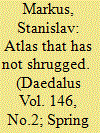

|
|
|
|
|
| Summary/Abstract |
There is demand among Russia's oligarchs for systemic change, but not for the rule of law proper. Instead, it is the defacto accountability of political elites and improved relations with the West that the Russian oligarchs want from the Kremlin. However, the oligarchs currently lack the capacity to effect change. Their insufficient leverage vis-à-vis Putin is rooted in their competition for rents, which prevents them from confronting the Kremlin as a united force. In addition to analyzing the lack of systemic pressure for change from the oligarchs, this essay considers the prospects of individual oligarchs who have nevertheless pushed openly for liberalization or tried to effect incremental change. It also draws on comparisons with other countries to chart the political behavior of Russia's business elites in the future.
|
|
|
|
|
|
|
|
|
|
|
|
|
|
|
|
| 2 |
ID:
113540
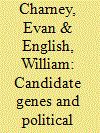

|
|
|
|
|
| Publication |
2012.
|
| Summary/Abstract |
Political scientists are making increasing use of the methodologies of behavior genetics in an attempt to uncover whether or not political behavior is heritable, as well as the specific genotypes that might act as predisposing factors for-or predictors of-political "phenotypes." Noteworthy among the latter are a series of candidate gene association studies in which researchers claim to have discovered one or two common genetic variants that predict such behaviors as voting and political orientation. We critically examine the candidate gene association study methodology by considering, as a representative example, the recent study by Fowler and Dawes according to which "two genes predict voter turnout." In addition to demonstrating, on the basis of the data set employed by Fowler and Dawes, that two genes do not predict voter turnout, we consider a number of difficulties, both methodological and genetic, that beset the use of gene association studies, both candidate and genome-wide, in the social and behavioral sciences.
|
|
|
|
|
|
|
|
|
|
|
|
|
|
|
|
| 3 |
ID:
187388
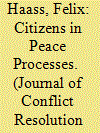

|
|
|
|
|
| Summary/Abstract |
Citizen engagement in and support for peace processes have been deemed important for sustainable peace after civil wars. Yet much of what we know about peace processes in civil wars centers on the interests of elite actors. This special feature aims to advance a research agenda focusing on citizens in peace processes to address this mismatch. In the introduction to the special feature, we first present empirical evidence situating citizens in relation to civil war peace processes. We then trace the current state of the literature on the roles of citizens in peace processes. Following that, we introduce a conceptual framework designed to improve scholarly analysis of the political behavior of citizens in peace processes. We also locate the individual contributions to the special feature within the framework in order to demonstrate its utility and as a means of helping to identify directions for future research.
|
|
|
|
|
|
|
|
|
|
|
|
|
|
|
|
| 4 |
ID:
096298
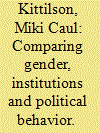

|
|
|
|
|
| Publication |
2010.
|
| Summary/Abstract |
Integrating the behavioral and institutional approaches to comparative politics will provide a more comprehensive theoretical framework for understanding why differences in political engagement among men and women vary cross-nationally and cross-temporally. This essay advances the argument that gender-related policies and institutions are not only outcomes in the political process, but also exert powerful influence over citizens' interests, values, and perceptions of politics. This policy feedback loop has implications for a wide array of political attitudes and activities-from political interest to running for elected office. Specifically, the adoption and expansion of national policies on issues such as equal wages, childcare provision, paid maternity leave, and violence against women carry important messages to the electorate: Issues that disproportionately affect women, long considered private, have become important national policy choices.
|
|
|
|
|
|
|
|
|
|
|
|
|
|
|
|
| 5 |
ID:
116461
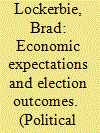

|
|
|
|
|
| Publication |
2012.
|
| Summary/Abstract |
Do our models of political behavior bear any resemblance to reality? Forecasting elections is one opportunity to assess whether our models of voting behavior are accurate. Over the past few decades, political scientists have been willing to put themselves out there to forecast elections. Explaining a past event allows us the ability to retrofit our models before we make them available to the broader community. In short, forecasting elections provides us the opportunity to develop humility. The forecasting community has done a reasonable job over the past few elections. Aside from 2000, forecasters have been largely accurate. Even in 2000, the forecasting community can claim a modest victory. The community was right about the popular vote winner; it just happened that the popular vote winner lost the election that counts-the Electoral College.
|
|
|
|
|
|
|
|
|
|
|
|
|
|
|
|
| 6 |
ID:
090807
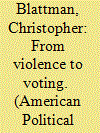

|
|
|
|
|
| Publication |
2009.
|
| Summary/Abstract |
What is the political legacy of violent conflict? I present evidence for a link from past violence to increased political engagement among excombatants. The evidence comes from northern Uganda, where rebel recruitment generated quasiexperimental variation in who was conscripted by abduction. Survey data suggest that abduction leads to substantial increases in voting and community leadership, largely due to elevated levels of violence witnessed. Meanwhile, abduction and violence do not appear to affect nonpolitical participation. These patterns are not easily explained by conventional theories of participation, including mobilization by elites, differential costs, and altruistic preferences. Qualitative interviews suggest that violence may lead to personal growth and political activation, a possibility supported by psychological research on the positive effects of traumatic events. Although the generalizability of these results requires more evidence to judge, the findings challenge our understanding of political behavior and point to important new avenues of research.
|
|
|
|
|
|
|
|
|
|
|
|
|
|
|
|
| 7 |
ID:
126339
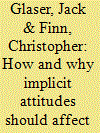

|
|
|
|
|
| Publication |
2013.
|
| Summary/Abstract |
This article provides a foundation for understanding the role of implicit biases in political behavior, particularly implicit racial attitudes and voting behavior. Although racial attitudes have rarely played a major direct role in American presidential politics until 2008, numerous local, state, and federal elections are held every year in the United States that involve minority candidates. As a result, the implications are considerable.
|
|
|
|
|
|
|
|
|
|
|
|
|
|
|
|
| 8 |
ID:
171277
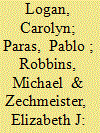

|
|
|
|
|
| Summary/Abstract |
Data quality in survey research remains a paramount concern for those studying mass political behavior. Because surveys are conducted in increasingly diverse contexts around the world, ensuring that best practices are followed becomes ever more important to the field of political science. Bringing together insights from surveys conducted in more than 80 countries worldwide, this article highlights common challenges faced in survey research and outlines steps that researchers can take to improve the quality of survey data. Importantly, the article demonstrates that with the investment of the necessary time and resources, it is possible to carry out high-quality survey research even in challenging environments in which survey research is not well established.
|
|
|
|
|
|
|
|
|
|
|
|
|
|
|
|
| 9 |
ID:
127830
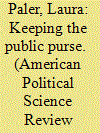

|
|
|
|
|
| Publication |
2013.
|
| Summary/Abstract |
It is widely believed that rents from windfall revenue undermine accountability. An enduring explanation is that windfalls free leaders from the need to tax, producing a quiescent population. Yet, there is little direct evidence of how windfalls and taxes affect citizen political action. I use novel revenue and information experiments to examine whether and why windfalls (compared to taxes) affect how citizens participate in politics. The experiments were embedded in a public awareness campaign conducted with 1,863 citizens in Indonesia. The results-from an original survey and postcard campaign-indicate that the tax treatment increased monitoring and anti-incumbent political action. Yet, when given spending information, citizens in the windfall treatment cared just as much about misused revenue as those in the tax treatment. The findings have important implications for understanding not only how revenue affects citizen political behavior but also how people acquire and process information on government spending
|
|
|
|
|
|
|
|
|
|
|
|
|
|
|
|
| 10 |
ID:
182590
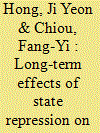

|
|
|
|
|
| Summary/Abstract |
This article examines how violence against citizens affects their political attitudes and behavior in the long run, and how those effects vary over time. We construct and analyze a novel dataset on the victims of Taiwan's February 28 Incident, in 1947, with survey data spanning 1990 to 2017. Our empirical analysis shows that cohorts having directly or indirectly experienced the Incident are less likely to support the Kuomintang Party (KMT), the former authoritarian ruling party responsible for the Incident. They tend to disagree with the key conventional policy stand of the KMT (unification with mainland China), are more likely to self-identify as Taiwanese, and are less likely to vote for KMT presidential candidates. Taiwan's residents who were born in towns with larger number of casualties during the Incident are more likely to reject unification. Finally, the effects are found to vary over the period following democratization.
|
|
|
|
|
|
|
|
|
|
|
|
|
|
|
|
| 11 |
ID:
102360
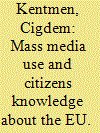

|
|
|
|
|
| Publication |
2010.
|
| Summary/Abstract |
The impact of the mass media on individuals' political behavior has received a lot of scholarly attention. However, there has been little research done to determine whether and to what degree the media affects citizens' knowledge about the EU. This paper examines whether Turkish citizens' level of knowledge about the EU varies with exposure to television, radio and newspapers using empirical evidence from the 2006 Eurobarometer survey data.
|
|
|
|
|
|
|
|
|
|
|
|
|
|
|
|
| 12 |
ID:
179423
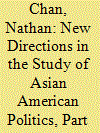

|
|
|
| 13 |
ID:
105450
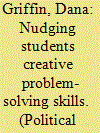

|
|
|
|
|
| Publication |
2011.
|
| Summary/Abstract |
People often make choices that go against their own best interests. In the controversial bestseller Nudge, Richard Thaler and Cass Sunstein argue that people can benefit from simple "nudges" to improve their decision-making. In an upper-level undergraduate course on political decision-making, I created a series of assignments around Nudge. In the project, students designed their own "nudges" to solve a variety of political and social problems. Students gave this assignment rave reviews, not only for the course content they learned, but also for what they discovered about their connections to society and its problems. In this article, I describe the assignment and report students' evaluations of it. This assignment could be tailored to any course on political behavior, public policy, or public administration.
|
|
|
|
|
|
|
|
|
|
|
|
|
|
|
|
| 14 |
ID:
097894
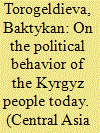

|
|
|
| 15 |
ID:
079746
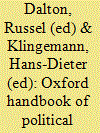

|
|
|
|
|
| Publication |
Oxford, Oxford University Press, 2007.
|
| Description |
xvi, 992p.
|
| Standard Number |
9780199270125
|
|
|
|
|
|
|
|
|
|
|
|
Copies: C:1/I:0,R:1,Q:0
Circulation
| Accession# | Call# | Current Location | Status | Policy | Location |
| 052874 | 306.2/DAL 052874 | Main | On Shelf | Reference books | |
|
|
|
|
| 16 |
ID:
127816
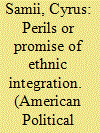

|
|
|
|
|
| Publication |
2013.
|
| Summary/Abstract |
A central question in the study of political development is how conflict between ethnic groups might be transcended. Findings from social psychology suggest that ethnically integrating institutions such as militaries or representative bodies may remove prejudices and exclusionary behavior that perpetuate interethnic animosity. Political scientists have tended to be skeptical, arguing that such processes may actually intensify or "freeze" conflicting ethnic identities. I use evidence from a hard case-military reform in the aftermath of a brutal, ethnically charged civil war in Burundi-to study this issue. At the macro level, the Burundian military undertook extensive quota-based integration that nonetheless resulted in a cohesive institution. A micro-level natural experiment, which produces quasirandom exposure to ethnic integration through the military retirement age, shows that exposure to ethnic integration decreases prejudicial behavior and is benign with respect to ethnic salience. Together, these results suggest promise in ethnic integration.
|
|
|
|
|
|
|
|
|
|
|
|
|
|
|
|
| 17 |
ID:
099286
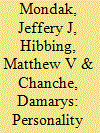

|
|
|
| 18 |
ID:
156702
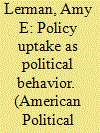

|
|
|
|
|
| Summary/Abstract |
Partisanship is a primary predictor of attitudes toward public policy. However, we do not yet know whether party similarly plays a role in shaping public policy behavior, such as whether to apply for government benefits or take advantage of public services. While existing research has identified numerous factors that increase policy uptake, the role of politics has been almost entirely overlooked. In this paper, we examine the case of the Affordable Care Act to assess whether policy uptake is not only about information and incentives; but also about politics. Using longitudinal data, we find that Republicans have been less likely than Democrats to enroll in an insurance plan through state or federal exchanges, all else equal. Employing a large-scale field experiment, we then show that de-emphasizing the role of government (and highlighting the market's role) can close this partisan gap.
|
|
|
|
|
|
|
|
|
|
|
|
|
|
|
|
| 19 |
ID:
102077
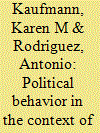

|
|
|
| 20 |
ID:
189864
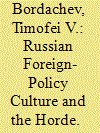

|
|
|
|
|
| Summary/Abstract |
This article scrutinizes the historical impact of the Mongolian Horde on
Russia’s foreign policy behavior. The author comes up with a hypothesis
that relations with the Horde were not only important for Russia during
the critical historical period of its formation, but also largely determined
its unique foreign-policy culture and practical implementation of Russian
foreign policy in subsequent periods. The author maintains that the key
element of this impact was peaceful integration of the powerful neighbor
which posed the biggest threat to the Great Russians for more than two
hundred years.
|
|
|
|
|
|
|
|
|
|
|
|
|
|
|
|
|
|
|
|
|